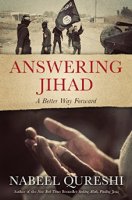In Answering Jihad, Nabeel Qureshi tackles the difficult task of explaining the roots of modern-day jihad. The work includes a very personal recounting of the author's exploration of the Quran and Hadith traditions of Muhammad’s life. Born into a devout Muslim household, Qureshi grew up understanding Islam as a “religion of peace.” He heard this rhetoric from most other Muslims, including imams and politicians. However, such statements contradicted the occasional terrorism done in the name of Allah. So Qureshi began a personal investigation into the origins of Islam. His research led him to the conclusion that these foundations of Islam indeed taught violence. Jihadists are serious Muslims who have returned to the sources, in a parallel of sorts to Protestants during the sixteenth century Reformation. Nevertheless, Qureshi challenges readers not to return violence for violence but to find a better way forward, demonstrating Christian love toward Muslim neighbors.
In his introductory remarks, Qureshi explains how he had long avoided writing a book on jihad because he felt this topic was “so charged that even broaching the subject makes one’s intentions appear suspect.” He had chosen to offer his opinions to individuals rather than write a book. However, the recent escalation of violent action from radical Islamists around the world moved him to write Answering Jihad.
He explains that Islam traces its genesis to the life of Muhammad. Though thousands of sources can be found reporting Muhammad’s life and sayings, the most reliable information can be found in the Quran and the Hadith (traditional sayings of Muhammad, including the sunnah, or the actions of Muhammad according to Islamic tradition). Much to his chagrin, Qureshi found that Muhammad’s life had become increasingly violent and aggressive as he gained power. Quranic teachings on peace were recorded in the early years of Muhammad’s preaching (the first thirteen). The traditional Muslim hermeneutical method holds that later writings supersede former ones. Thus, the later violent writings in the Quran overrule the earlier peaceful offerings. As Qureshi studied the Hadith, these ideas were only reinforced. He came to the inescapable conclusion that Islam was founded on violent and aggressive actions and teachings.
The goal of groups such as ISIS, al-Quida, and Boko Haram is to return Islam to a caliphate (a single world-wide governance for all Muslims) and usher in the end of time. Violent means are intended to honor their perception of Muhammadian examples and teachings while polarizing and clarifying fundamentalist Muslims values. According to Qureshi, this worldview echoes the actions and teachings articulated by Muhammad in the last ten years of his career. More moderate practitioners of the religion might be taking Islam in a different direction than Muhammad may have been indicating in his later years.
For Qureshi, the realization that radicals best exemplified the origins of his native religion caused a crisis of faith. He felt pushed to a “three pronged” decision: go apostate and leave Islam, re-imagine Islam as a peaceful religion cut loose from its violent origins, or become a fundamentalist jihadist. Qureshi chose to leave his Muslim upbringing and become a Christian. He tells that story in a previous book, Seeking Allah, Finding Jesus (Zondervan, 2016).
Answering Jihad is organized into three parts, and each part is divided into six chapters. Each of these chapters asks and answers a different question. Part 1 explains the Muhammadian origins of jihad. Part 2 explores jihad as it is manifested today. Part 3 discusses “Jihad in a Judeo-Christian Context.” Though the entire work is geared to help outsiders understand Islam, this section is especially helpful to a Christian reader. Qureshi asks and answers two questions: “How does jihad compare with Old Testament warfare?” and “How does jihad compare with the Crusades?” The book’s main body concludes with the author admonishing readers to reach out to Muslim neighbors in love and compassion rather than with violence. At the base of his “better way” is Christ’s teachings, such as the Sermon on the Mount.
The four appendices offer further background information: a timeline of Islam; “Muhammad’s Words on Jihad” (actual verses from the Sahih al-Bukari); the answer to the question, “What is a caliphate?”; and details about the Ahmadi Muslim sect. Appendix B, in which the author lays out the collection of violent, pro-jihad verses he quoted throughout the book, is especially helpful for those who have never read the Islamic source material. The book ends with a glossary of Islamic terms and a sneak peek at Qureshi’s following work, the much lengthier and important, No God but One: Allah or Jesus? (Zondervan, 2016).
Qureshi’s intent is to teach the uninformed. Answering Jihad can be easily understood by a reader who has done little or no prior background reading on this topic. Qureshi supports the suppositions he makes with quotes and other references from the source material. He writes in a style that is very easy to read, while creating a cogent logical argument. The book, though relatively brief, is filled with information about Muslims and the Islamic religion. It will expand most readers’ understanding of Islam in general and of the radical Islamic fundamentalists in particular.
If Islam is a “religion of peace,” the violent action perpetrated by groups and individuals represents an elephant in the room. Though Qureshi faces the issue square on, his compassion for Muslim persons offers a refreshing change from most popular, fearful, and reactionary rhetoric on Islam. The reader is left wondering what other helpful resources Qureshi may have produced for the church had he not died from cancer in 2017 at the young age of thirty-four.
